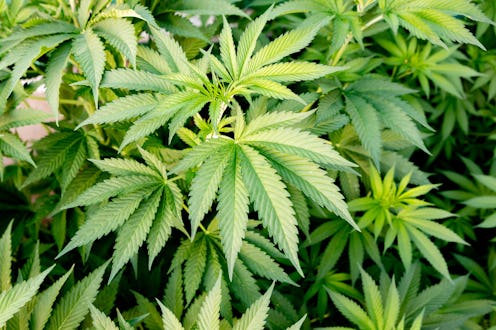Life
The First Cannabis-Based Medicines Have Been Approved For Use On The NHS

Using cannabis for medicinal purpose has always been a contentious topic in the UK. However, for those suffering with certain medical conditions, it could be life changing. Using one of cannabis' non-psychoactive ingredients CBD, in beauty and lifestyle products has become very popular over the last year as more research has gone into what exactly its effects are. But now the first cannabis-based medicines have been approved for use on the NHS, potentially marking a big turning point for people who suffer with MS and epilepsy. Yet the roll out of the drugs may not be as widespread as it seems.
The National Institute For Health & Care Excellence (NICE) looked into cannabis-based products to treat certain conditions and have created new guidelines for the NHS.
In light of the new guidelines, one medicine that doctors will be able to prescribe is Epidyolex, which will help children with two types of severe epilepsy, Lennox Gastaut syndrome and Dravet syndrome. Sufferers of these conditions can have multiple seizures a day and the new treatment could reduce them by up to 40%. Epidyolex only contains cannabidiol (CBD).
NICE also looked into Sativex, which is administered as a mouth spray. It’s been approved as a treatment for muscle stiffness and spasms for people who suffer with multiple sclerosis. The treatment contains both CBD and THC, the latter being the psychoactive ingredient in cannabis.
Professor Helen Cross, who is a paediatric neurologist at Great Ormond Street Hospital, led the UK trials of Epidyolex and, speaking to the BBC, she said, "Dravet and Lennox Gastaut syndromes are both complex difficult epilepsies with limited effective treatment options and this gives patients another option… that could make a difference to care."
These changes have been welcomed by many, but some campaigners say the change doesn’t go far enough. According to the Guardian, Millie Hinton from the campaign End Our Pain has said that these new guidelines were, in fact, a "missed opportunity," calling the guidance given "restrictive." One issue Hinton raised was the fact that "no cannabis-based treatments have been recommended to treat pain," and that there is "no positive recommendation that the NHS should allow prescribing of whole-plant medical cannabis containing both CBD and THC in appropriate cases of intractable childhood epilepsy."
While the law changed in 2018 to make it legal for doctors to prescribe medical cannabis, the Guardian reports that many have been reluctant to do so due to a lack of clear guidance. This meant that families of sufferers have gone abroad seeking help and treatment.